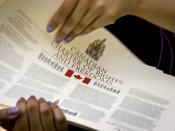Despite an increasing emphasis on media ethics there are many who remain skeptical about the very notion. There is a presumption that the media ought to be ethical in its professional conduct, thus concentrating on journalistic codes, guidelines, and ideals of media responsibility.
To some the very idea of media ethics appears paradoxical: the phrase itself an oxymoron. How could journalists possibly hope to get at stories that matter if they have to be completely honest in their investigations or respect the feelings, wishes and privacy of the subjects of their reports?
It is expected that news journalism must aspire to the goal of truth, and in such a way that what is reported is set in context and promotes the audience's understanding of why the event is significant. It is this ideal that is the very foundation of the news media as the fourth estate. The aim of this implicit contract between the public and the news media is to share knowledge and understanding of current events and developments in the world around us.
Hence the news media's duty is to provide true, unbiased reports that enable the public to get a speedy but informed grasp on happenings to people and institutions which not only directly affect our society but are of social, cultural, or human interest.
Patriotism, personal beliefs and ideologies all contribute to a journalist's bias in the media. Forms of bias may include political or corporate, as well as bias related to race, age, sex, religion or culture (Sanders 2003).
Bias can also assume a more obscure form, such as a journalist's failing to disclose conflicts of interest which could possibly affect the accuracy, fairness or independence of journalism (Warren 1999).
Bias in the media often goes hand in hand with sensationalism, as in the case...


